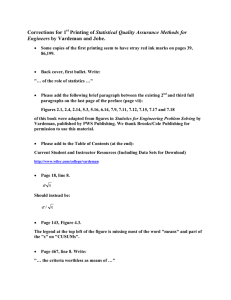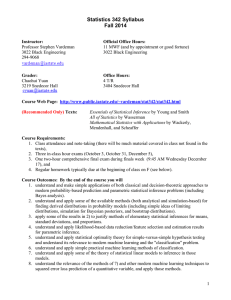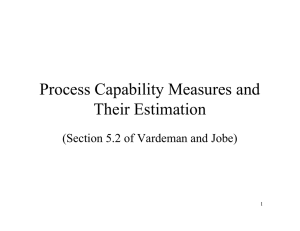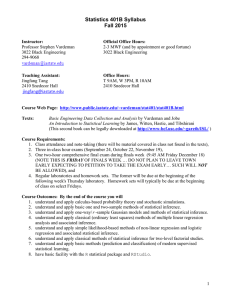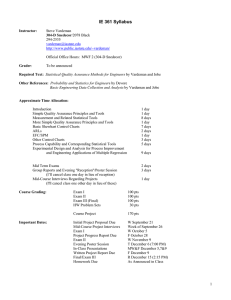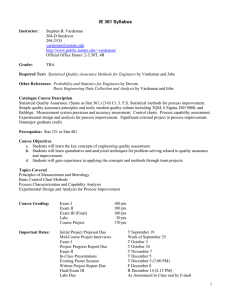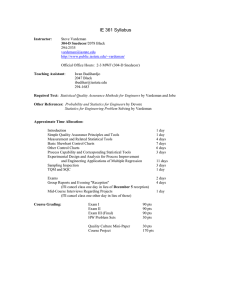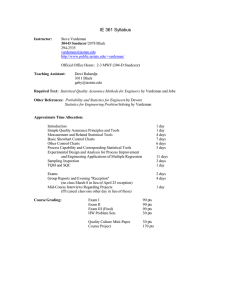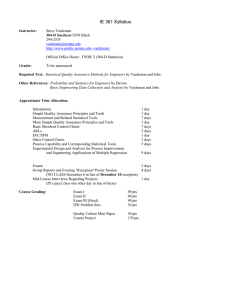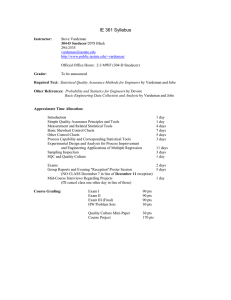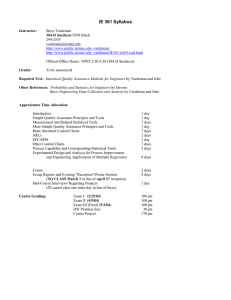Statistics 231 Syllabus Fall 2013
advertisement
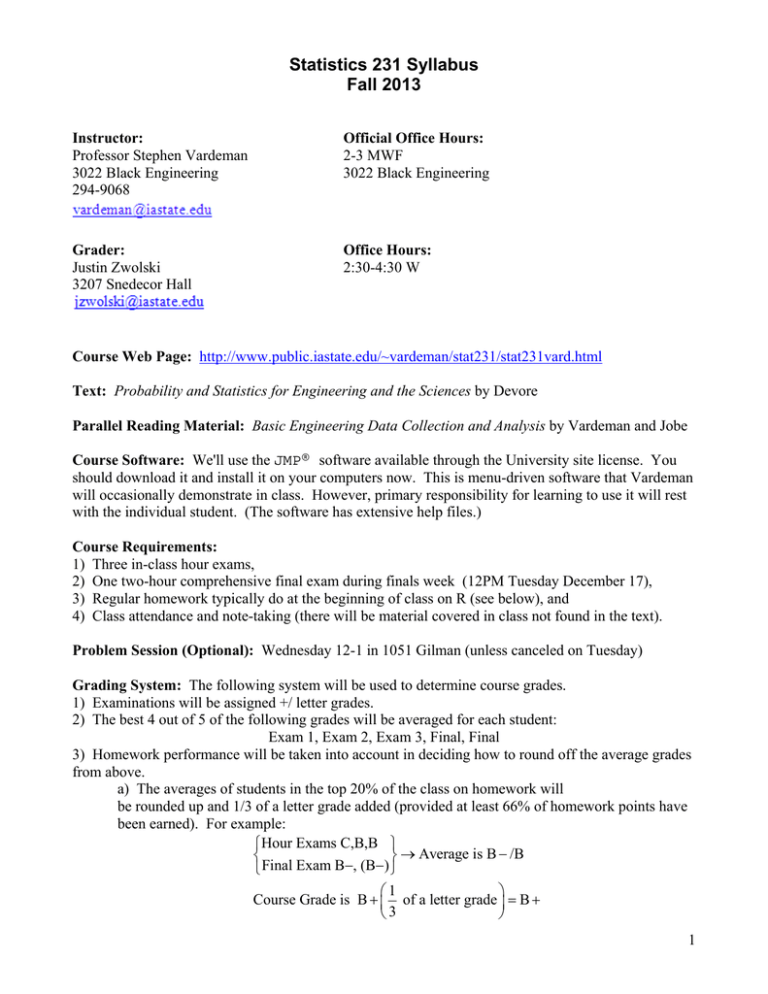
Statistics 231 Syllabus Fall 2013 Instructor: Professor Stephen Vardeman 3022 Black Engineering 294-9068 Official Office Hours: 2-3 MWF 3022 Black Engineering Grader: Justin Zwolski 3207 Snedecor Hall Office Hours: 2:30-4:30 W Course Web Page: http://www.public.iastate.edu/~vardeman/stat231/stat231vard.html Text: Probability and Statistics for Engineering and the Sciences by Devore Parallel Reading Material: Basic Engineering Data Collection and Analysis by Vardeman and Jobe Course Software: We'll use the JMP® software available through the University site license. You should download it and install it on your computers now. This is menu-driven software that Vardeman will occasionally demonstrate in class. However, primary responsibility for learning to use it will rest with the individual student. (The software has extensive help files.) Course Requirements: 1) Three in-class hour exams, 2) One two-hour comprehensive final exam during finals week (12PM Tuesday December 17), 3) Regular homework typically do at the beginning of class on R (see below), and 4) Class attendance and note-taking (there will be material covered in class not found in the text). Problem Session (Optional): Wednesday 12-1 in 1051 Gilman (unless canceled on Tuesday) Grading System: The following system will be used to determine course grades. 1) Examinations will be assigned +/ letter grades. 2) The best 4 out of 5 of the following grades will be averaged for each student: Exam 1, Exam 2, Exam 3, Final, Final 3) Homework performance will be taken into account in deciding how to round off the average grades from above. a) The averages of students in the top 20% of the class on homework will be rounded up and 1/3 of a letter grade added (provided at least 66% of homework points have been earned). For example: Hour Exams C,B,B Average is B /B Final Exam B, (B) 1 Course Grade is B of a letter grade B 3 1 b) The averages of students not in the top 20% of the class on homework but with at least 66% of all possible homework points will be rounded up. For example: Hour Exams C,B,B Average is B /B Final Exam B, (B) Course Grade is B c) The averages of students with 50%-66% of all homework points will be rounded down. For example: Hour Exams C,B,B Average is B /B Final Exam B, (B) Course Grade is B d) The averages of students with less than 50% of all homework points will be rounded down, and (at Prof. Vardeman's discretion) 1/3 of a letter grade may be subtracted in order to produce a course grade. For example, potentially: Hour Exams C,B,B Average is B /B Final Exam B, (B) 1 Course Grade is (B) of a letter grade C 3 Words of Wisdom: This course will be a lot of work and you may very well find it to be one of the toughest courses you take at ISU. The material of the course is absolutely essential to both education and practice in Industrial Engineering. All of IE 361, IE 413, IE 441, IE 446, IE 448, and IE 483 are heavily dependent upon the material you will meet in Stat 231. Decide to give it your best shot from the very beginning, and to keep after it even if you suffer initial set-backs. If you do so, you will find it doable and even interesting. But don't expect to do everything the night before homework is due or an exam is scheduled. Such an approach will leave you frustrated, confused and disappointed. A consistent effort throughout the course is required. You will find Prof. Vardeman interested in helping you to master the material of Stat 231, but absolutely unbending in the requirement that you do so. For those of you who have had a low-level (perhaps high school) course in statistics and found it to be boring plug-and-chug garbage-level mathematics, be informed that those courses are no predictor of what we will meet in Stat 231. This course will be neither plug-and-chug nor trivial. Academic Honesty: Prof. Vardeman and his Departments expect that all students will be honest in their actions and communications. Individuals suspected of committing academic dishonesty will be reported to the Dean of Students Office per University policy. For more information regarding Academic Misconduct see http://www.dso.iastate.edu/ja/academic/misconduct.html Professionalism Statement: Prof. Vardeman and his Departments expect that all students will behave in a professional manner during all interactions with fellow students, faculty, and staff. Treating others with respect and having constructive communications (including use of appropriate forms of address) are examples of being professional. Being prompt and considerate of your classmates and instructor in your coming and going are examples of being professional. Class is scheduled for 12:10-1:00. Prof. Vardeman will do his best to start and end promptly. Please do your part too. If you must (unavoidably) arrive late, please get in and into a seat with as little commotion as possible. If you are 2 (unavoidably) going to have to leave early (even a couple minutes early), it is common courtesy to let your instructor know in advance, and then try to get out as unobtrusively as possible. A lecture (like a business meeting!) is not a salad bar where participants drift in and out as it suits them. We will practice civil/courteous/professional behavior in 231. Texting or surfing the Web or using electronic games or communication devices, reading newspapers, doing puzzles, and carrying on extra-curricular conversations during lectures are all examples of unprofessional and completely unacceptable classroom conduct. Prof. Vardeman WILL stop class, make a scene, and potentially ask you to leave if you engage in such behavior. PLEASE do not precipitate such unpleasantness by ignoring this expectation of civil/considerate behavior. Accommodation for Students with Disabilities: Iowa State University complies with the Americans with Disabilities Act and Section 504 of the Rehabilitation Act. If you have a disability and anticipate needing accommodations in this course, please contact Prof. Vardeman before the end of the 2nd week of the semester. Later requests for accommodations may not be honored. Anyone requesting an accommodation will need to obtain a SAAR form with recommendations for accommodations from the Disability Resources Office, located in Room 1076 of the Student Services Building. Approximate Schedule Date M 8/26 T 8/27 R 8/29 F 8/30 Topic Introduction Descriptive Statistics/Probability Probability M 9/2 T 9/3 R 9/5 F 9/6 Labor Day---No Class Reading (Devore) Chapter 1 Chapters 1/2 Chapter 2 Discrete Random Variables Chapter 3 M 9/16 T 9/17 R 9/19 F 9/20 Continuous Random Variables Chapter 4 M 9/23 T 9/24 R 9/26 Joint Distributions Chapter 5 (5.1, 5.2) Distribution of g X , Y (Section 5.3), Class Notes F 9/27 Laws of Expectation and Variance (Section 5.5), Class Notes M 9/30 T 10/1 R 10/3 F 10/4 Propagation of Errors CLT CLT/Transition to Statistics Notes (Problem 5.93) (Section 5.4) Class Notes M 9/9 T 9/10 R 9/12 F 9/13 3 M 10/7 T 10/8 R 10/10 F 10/11 M 10/14 T 10/15 R 10/17 F 10/18 M 10/21 T 10/22 R 10/24 F 10/25 M 10/28 T 10/29 R 10/31 F 11/1 M 11/4 T 11/5 R 11/7 F 11/8 M 11/11 T 11/12 R 11/14 F 11/15 M 11/18 T 11/19 R 11/21 F 11/22 M 12/2 T 12/3 R 12/5 F 12/6 Exam I over material through 10/1 (Probability) Interval Estimation Chapter 7 Testing Chapter 8 Two Sample Estimation and Testing Chapter 9 Simple Linear Regression Chapter 12 Exam II over material 10/3 through 10/29 (Basic 1- and 2-Sample Inference) Aptness of SLR Model/Remedial Measures Sections 13.1, 13.2 Lack of Fit Class Notes (Problem 13.14) Multiple Regression Sections 13.3 - 13.5 and Notes One-Way ANOVA Chapter 10 Exam III over material 10/31 through 12/3 (Regression) M 12/9 T 12/10 R 12/12 F 12/13 One-Way ANOVA Chapter 10 Statistics and Measurement One-Way Random Effects Analyses Class Notes Class Notes T 12/17 COMPREHENSIVE FINAL EXAM 4
